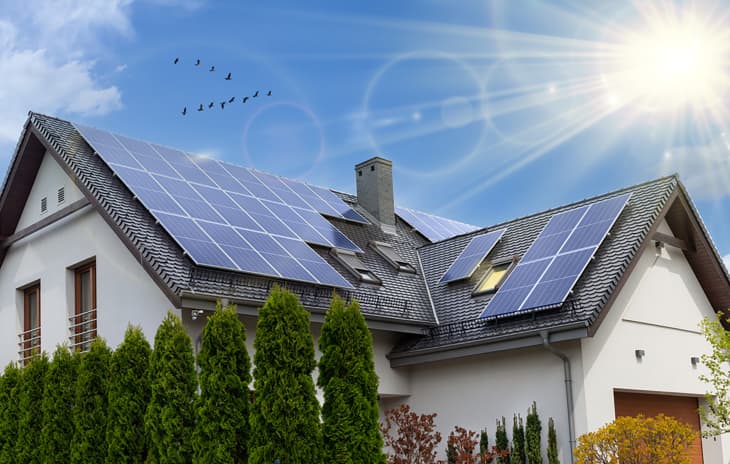The One Question You Should Ask Yourself Before Getting Solar Panels

If you’re worried about climate change and want to rely less on fossil fuels in your daily life, installing solar panels on your home can be a good — and popular — option. Long-term, they can also help you save money on electricity for your home.
But even though residential solar panels have become increasingly common in recent years, the whole process can still be confusing — and, to be honest, a little intimidating.
If you’re a homeowner who’s considering getting solar panels installed, you should ask yourself one question first: How long do I plan to own this house?
That’s according to Blake Blahut, a broker associate and real estate agent at Realty ONE Group Inspiration in Orlando. The answer to that question can help you determine whether installing solar panels will be a worthwhile investment or not.
Why? Even with the federal tax credits that are available to some, most homeowners can’t afford to buy their solar panels outright, so they need to take out a loan. If you decide to sell your home before you pay off the loan, you’ll either need to convince the buyer to take on that debt or you’ll need to pay off the balance at closing — and both of those possible outcomes can be tricky, says Blahut.
“Through representing various homeowners with solar panels installed, I often see that the seller ends up taking a substantial loss when it comes time to close,” he says. “Most of the time, the buyer is expecting the seller to pay off the balance of these panels as opposed to having that debt transferred to them. Buyers, in many cases, might not qualify for the mortgage and the solar panels, which can either limit the buyer pool for that particular home or, unfortunately, force the seller to pay them off at the closing table.”
How much do solar panels cost?
The cost of solar panel installation varies greatly depending on your location, your home’s size, and the terms of your financing. But in 2024 the average cost of installing a solar panel system is $22,022, according to EnergySage, a solar marketplace with funding from the U.S. Department of Energy. In other words, solar panels are not cheap, which means you could be looking at a hefty bill if you need to pay off the balance all at once at closing.
Another reason to know how long you plan to stay in your home? You’ll want to calculate what’s known as the solar payback period, or how long it will take you to break even based on how much you spent on solar panels and how much you’re saving on energy bills. How long will it take for the panels to “pay for themselves” in savings?
Again, this can vary greatly depending on the circumstances, but the average solar payback period is about eight or nine years, according to EnergySage. After that point, the electricity from your solar panels is free.
“I would have an understanding of exactly what your electricity use has been — and what you plan it will be in the future — and then evaluate the length of time you will be in the home to recoup the costs,” says Lindsey Harn, a real estate agent in San Luis Obispo, California.
The Pros and Cons of Solar Panels
In theory, solar panels are supposed to add value to your home by making it more energy-efficient, which will save you (and prospective buyers) money on electricity. By one federal estimate, your home’s value increases $20 for every $1 reduction in annual utility bills.
A 2022 Zillow analysis also found that homes with solar panels sell for 1.4 percent more than expected. But that same Zillow study also found that homes with solar panels were slower to sell, sitting on the market for an average of 2.6 additional days longer than expected.
However, a 2022 study by Rocket Homes found that homes with solar spend 13.3 percent less time on the market compared to homes without and are 24.7 percent more likely to sell for over the asking price.
So, in reality, the ROI on solar panels can be a bit of a mixed bag.
“While I see the fantastic energy-saving benefits of solar panels as long-term investments, I have yet to see that investment enhance the value of a home or increase the seller’s ability to make the home more appealing to buyers,” says Blahut.
You may still decide that solar panels are right for you and, remember, there’s a lot of variability depending on your energy needs, the size and positioning of your roof, and how you end up paying for them. Some eco-friendly or budget-conscious buyers might be thrilled that your home is already equipped with solar, while others might see the system as an added maintenance and upkeep burden — it just depends on their point of view.
Bottom line: Before you dive in, take the time to consider all the various factors at play for your specific situation. Get quotes from installers, play around with online calculators, research any state or local tax credits that may be available, and contact your local electric utility company before proceeding.
